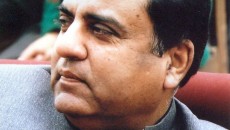A State without People
In the Middle Ages, military and feudal mindsets considered land important than people. Feudal lords and military both killed for land. To military, the State is a piece of land that is sacred. From this perspective, it is okay if a person dies for the State (territory).
Often I hear serving and retired military officers talking about the sacredness of the state. To them the state means only a territory. Under this approach, the territory becomes important than human life. People have to die or can be killed in saving the territory. It is license for human right abuses and disruption and destruction of any system.
In Pakistan, we saw Tahir-ul-Qadri chanting ‘save the state’ slogan. Every few years, the people of Pakistan are deprived of their rights in the name of saving the State.
People, territory, government and sovereignty are four elements of a state. Out of which people are the most important but in Pakistan, the people have least importance or respect in the state. The people of Pakistan have little say in their government. They also have no say in policies that determine Pakistan’s internal and external sovereignty.
True, Pakistan has a constitution and a representative government but the issue is implementation of the constitution in letter and spirit, respect for the rule of law and the peoples’ right to govern. Despite constitutional guarantees, there is no internal sovereignty in Pakistan. Foreign powers and institutions such as the IMF, WTO, and the World Bank control/influence Pakistan’s external sovereignty.
The formation of the European Union and the emergence of global village mean the territory, government and sovereignty are not very relevant any more. Super-states and supranational bodies are replacing nation states. Now people are citizens of many states and they all face similar challenges and issues.
It is time for new approaches and redefining the state where people come first, not territory or some institutions.
Shiraz Paracha is a famous writer and journalist and currently works at Abdul Wali Khan University Mardan (AWKUM) and Government of Khyber Pakhtunkhwa. He is known for his understanding with Central Asian issues. He had been working with Kazakhstan Institute of Management and Research and Press TV. He finished his studies in International Journalism at City University London.
Disclaimer:
The views and opinions expressed in this article/Opinion/Comment are those of the author and do not necessarily reflect the official policy or position of the Dispatch News Desk. Assumptions made within the analysis are not reflective of the position of Dispatch News Desk.






